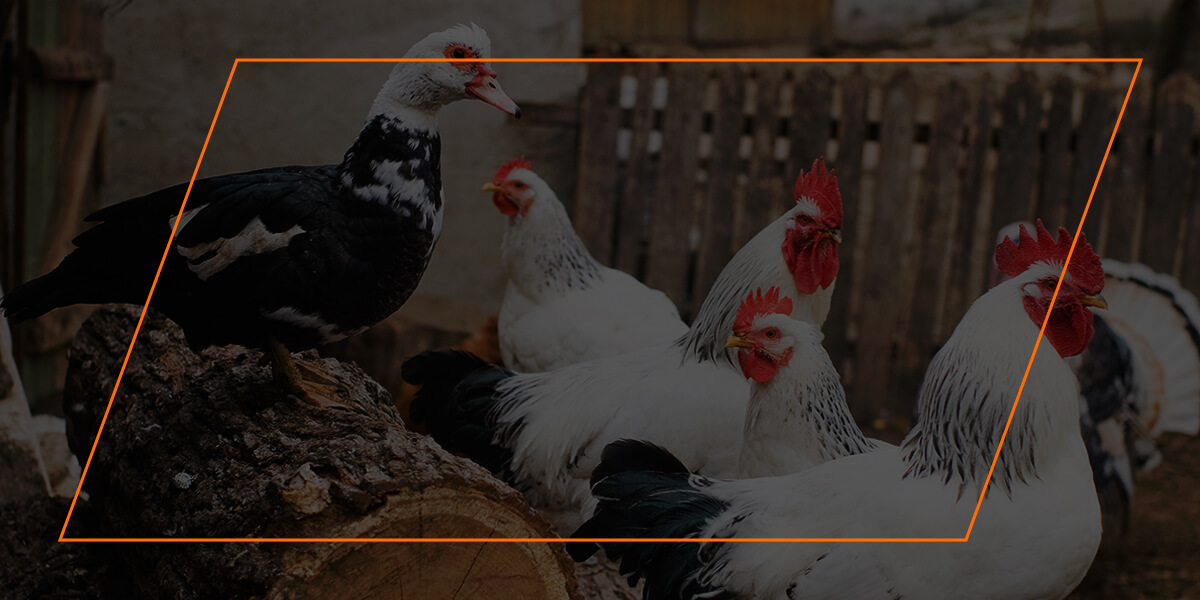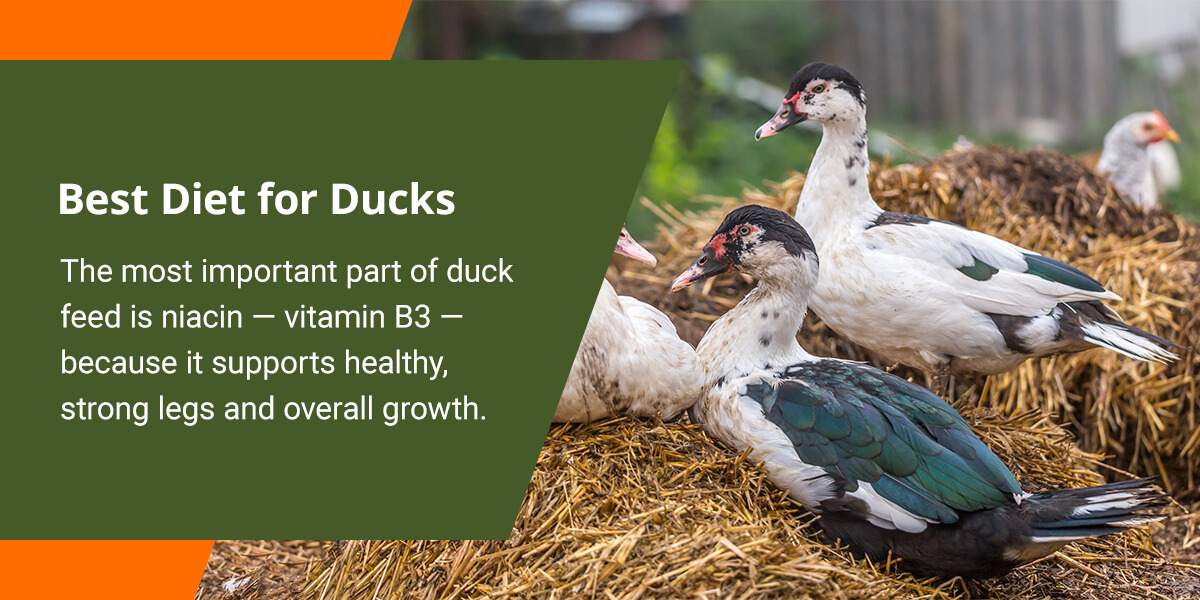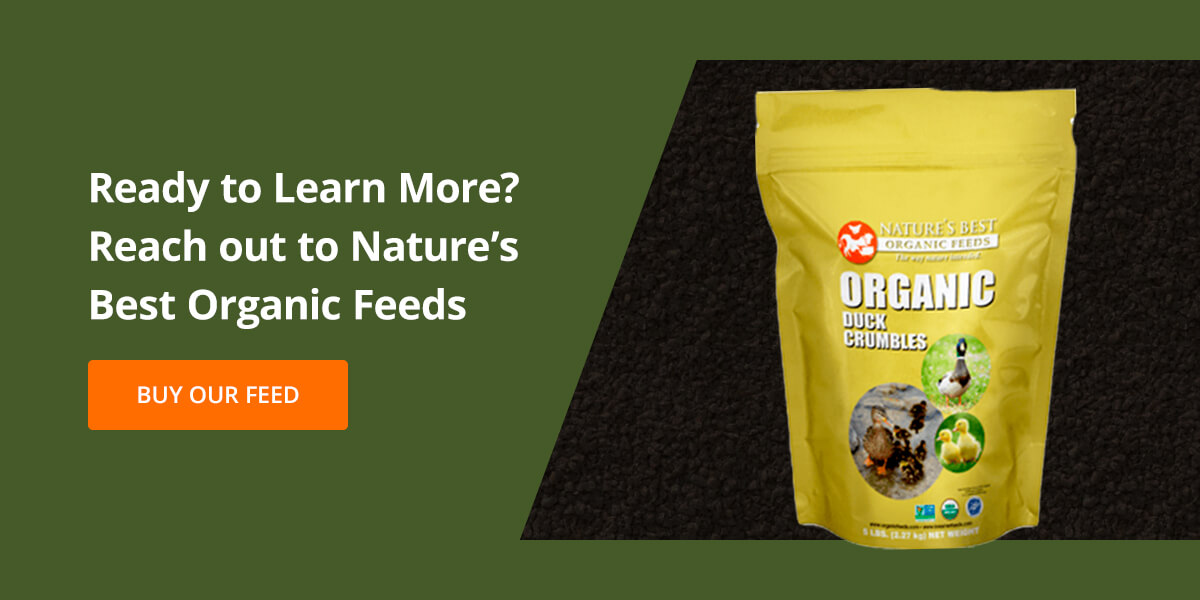
Can Ducks and Chickens Eat the Same Feed?
It’s a common question — can chickens and ducks eat the same feed? While your birds might enjoy sharing the same yard or barn space, you shouldn’t feed them the same food, especially if you have ducklings. Both chickens and ducks have separate nutritional needs, and specific food blends are created to fulfill them.
Is Duck Food the Same as Chicken Food?
Despite their many similarities, feed for backyard ducks and chickens is not the same. Each bird has its own nutritional needs, and portions and texture vary depending on its type and age.
Best Diet for Chickens
The majority of chicken feed is made of carbohydrates, but too high of a carb blend could stunt their growth. You should also pay attention to the crude protein and ash content levels. Crude protein measures the nitrogen content inside the feed, which lets you know if you’re giving your birds the right amount of amino acids with their daily meal. Ash content includes all inorganic minerals.
While chickens love a nice handful of scratch feed — a treat made of various cracked grains — you shouldn’t use it as a substitute for food. Avoid mixing it with their regular feed, as they could overindulge in scratch and miss out on the essential nutrients they need from their pellets, mash, or crumble.
Your chicken’s dietary needs shift as the seasons do, and they will likely eat less during the summer when temperatures are high. If so, supplement their feed with protein and vitamins, or choose a different feed concentration. Winter chickens eat more food than usual to stay warm, so adjust feed portions and purchases accordingly.
Feed texture also matters — meat birds thrive on pellets, and layers typically eat a non-pelleted mash. Broilers eat crumble, a milled version of standard pellets. Young and growing chickens need more protein than mature birds.
Your chicken’s diet may also vary if you’re raising them for a specific purpose. You might choose a mix with higher calcium levels if raising layers for optimal egg production, while birds raised for meat need more protein.

Best Diet for Ducks
The most important part of duck feed is niacin — vitamin B3 — because it supports healthy, strong legs and overall growth. Too little niacin has the opposite effect and could cause deformities or fragility. You should also prioritize protein amino acid levels to promote better aging, but avoid excessive high-energy blends if you’re raising your birds for eggs. You want to keep them at a healthy weight and prolong their laying days.
While some ducks eat mash, expect as much of a 10% reduction in growth compared to ducks on pellet feed. Ducklings get a starter diet of either small pellets or crumbles before switching to larger pellets after two weeks. Avoid ultra fine feed, which could cause choking.
Though feeding ducks pieces of bread is common at public lakes and campgrounds, it’s actually not healthy for waterfowl or your backyard flock.
Can I Feed Ducks and Chickens the Same Thing?
You shouldn’t feed your ducks the same food as your chickens, especially if they’re still young. These are a few of the dangers of chicken feed consumption for ducklings:
Over-Abundance of Protein
To understand why you shouldn’t give chicken feed to ducklings, it’s important to first know what’s in your chicken feed in the first place. Most chicken feeds contain a mixture of nutrients and minerals — so far, so good! However, they also often include a high amount of protein. This bolsters quick growth in chickens and prepares them for meat production or optimizes their egg laying.
You will want to be wary of the over-consumption of protein in your ducklings. Accelerated growth can cause them to develop foot and leg problems, which hinder their health. Additionally, you’ll want to be mindful in the case of feeding chicken feed to wild ducklings and ducks. Too much protein can cause them to develop a condition called angel wing, which prevents them from flying and migrating safely during the winter.
Lack of Niacin Vitamin
Healthy ducklings and ducks require a high level of niacin. This water-soluble amino acid is not stored in the body, causing ducks to require a regular supply in their feed to stay healthy. This is particularly important when ducklings are young and in their pivotal development stages. Chickens need lower levels of niacin in their diet, causing chicken feed to contain insufficient amounts for a duckling.
Different Methods of Feed Consumption
Keep in mind that chickens and ducks consume their feed differently. Chickens typically do not drink water while they eat their pellets or crumbles. Ducks, however, sip water with each mouthful of food. As a result, chickens have no problem eating their feed without water present, while ducks may choke if they don’t have access to enough clean water during feeding time.

Ready to Learn More? Reach out to Us Today!
Whether you’re feeding a single flock or a backyard full of poultry, the most crucial part of choosing their feed is making sure it’s free of harmful additives or too much filler and byproduct. Lack of nutrition can make your birds sick or weak, reduce egg laying and hatching, and could impact feather or body growth.
Contact us today to learn more about our organic duck and chicken feeds. We’ll be happy to answer any questions to confirm it’s a great choice for your flock. To find Nature’s Best Organic Feeds near you, simply use our store locator online.